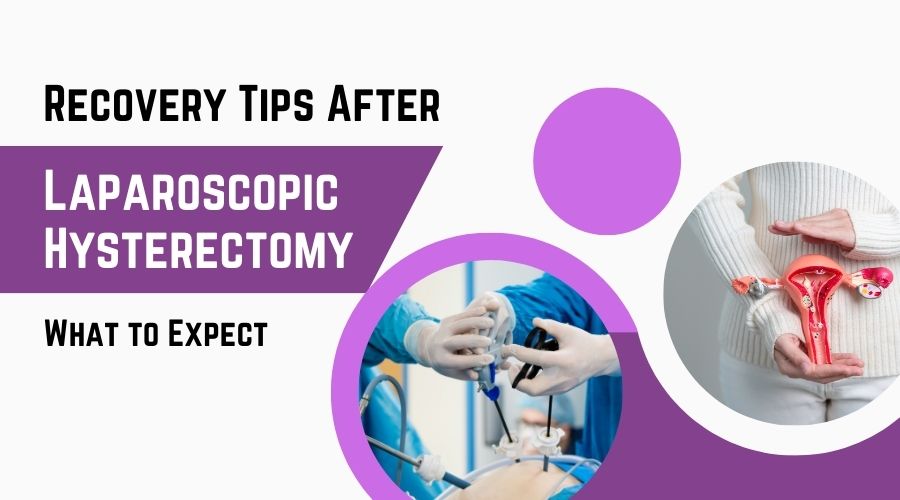
Undergoing a laparoscopic hysterectomy is a significant step in addressing various gynecological conditions. While the minimally invasive nature of the procedure offers numerous benefits, including smaller incisions, faster recovery, and reduced pain, understanding what to expect during the recovery process is essential. At drpreetitandon, we believe in empowering patients with the knowledge they need to navigate their post-surgery recovery journey confidently. Here are some important recovery tips after a laparoscopic hysterectomy:
1. Rest is Crucial
The first few days after your surgery will be a period of adjustment. While laparoscopic surgery is less invasive compared to traditional methods, your body still needs time to heal. Rest must be given top priority throughout the early stages of recuperation. You may feel fatigued and need to sleep more than usual—this is normal and essential for your body’s healing process. Avoid strenuous activities, lifting heavy objects, and even driving until your doctor gives the green light, which is typically around 6 weeks after surgery.
2. Manage Pain and Discomfort
Some level of pain or discomfort is common after a laparoscopic hysterectomy, but it is usually less intense than after a traditional abdominal hysterectomy. You may experience pain at the incision sites, bloating, or shoulder discomfort due to the gas used during the procedure. Your doctor at drpreetitandon will prescribe pain management strategies and medications to help keep you comfortable. Over-the-counter pain relievers like ibuprofen or acetaminophen may also be recommended for mild discomfort.
If you notice increasing or severe pain, especially accompanied by fever, unusual swelling, or redness around your incisions, be sure to contact your healthcare provider immediately. These could be signs of an infection or complication that needs attention.
3. Gradual Return to Normal Activities
One of the benefits of laparoscopic surgery is the faster recovery time compared to traditional hysterectomy techniques. Most women feel well enough to resume normal activities within 4 to 6 weeks, but it’s important to follow your doctor’s advice for a gradual return. While light activities such as walking or gentle stretching are encouraged, more strenuous activities such as running, lifting, or sex should be avoided until cleared by your doctor. This promotes a more seamless healing process and helps prevent issues.
4. Follow a Healthy Diet
An important factor in the healing process is nutrition. After surgery, it's important to stay hydrated and consume a balanced diet that supports tissue healing and boosts your energy levels. Focus on foods rich in vitamins, minerals, and proteins—such as lean meats, eggs, leafy greens, and whole grains. Iron-rich foods can also help replenish your body's stores, especially if you had heavy bleeding before the surgery.
Your doctor at drpreetitandon may also suggest specific dietary changes, especially if you experience digestive issues like constipation, which can occur after surgery due to anesthesia or medication. Drinking plenty of water and consuming fiber-rich foods, such as fruits, vegetables, and whole grains, can help prevent constipation.
5. Watch for Signs of Complications
Though laparoscopic hysterectomy is generally safe, it’s important to be aware of any complications that may arise during the recovery period. Some signs of complications to look out for include:
- Severe abdominal pain
- Unusual vaginal bleeding or discharge
- Fever above 100.4°F (38°C)
- Difficulty urinating or painful urination
- Redness, swelling, or pus around the incisions
If you experience any of these symptoms, contact drpreetitandon immediately for advice and potential intervention. More serious problems can be avoided with early detection and treatment.
6. Mental Health Matters
Recovery after a hysterectomy isn’t just physical; it can also be emotionally challenging. It's natural to experience a range of emotions, including sadness, anxiety, or even relief. If you’ve had the procedure due to a medical condition like fibroids, endometriosis, or cancer, it’s understandable to feel a sense of loss or worry about the future.
Don’t hesitate to seek emotional support during your recovery. This could include talking to a counselor, joining a support group, or confiding in loved ones. Your mental well-being is just as important as your physical recovery, and at drpreetitandon, we encourage you to take time for self-care and emotional healing.
7. Follow-Up Appointments Are Key
Finally, ensure that you attend all follow-up appointments with your doctor. These visits are important for monitoring your recovery progress, addressing any concerns, and ensuring that you are healing properly. At drpreetitandon, we take a personalized approach to recovery, ensuring that every patient’s journey is closely monitored and supported.
Recovery after a laparoscopic hysterectomy can be a smooth process when you follow your doctor’s instructions and prioritize your health. With proper rest, a healthy diet, and emotional support, you can navigate this recovery phase and feel like yourself again soon. If you have any concerns or need guidance, don’t hesitate to reach out to us at drpreetitandon.



